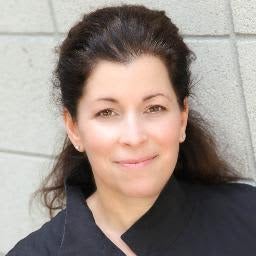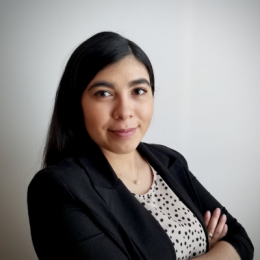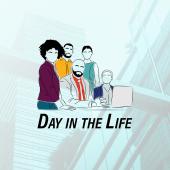
Carolyn Herzog
EXECUTIVE VICE PRESIDENT AND GENERAL COUNSEL
ARM LIMITED
SAN JOSE, CALIFORNIA
A ceramic fish sits on General Counsel Carolyn Herzog’s desk at Arm Limited. It’s a gift from her current team and a reminder of a story from her days at Symantec, a cybersecurity software and services company, when Herzog was living in the United Kingdom overseeing legal for Europe, the Middle East, and Africa. One of her team members, a German colleague who had more than one fish analogy, would remind coworkers: “The fish stinks from the head,” which means, if there’s a problem, it’s the leader’s fault. Her colleague would candidly share her thoughts by declaring, “I put the stinking fish on the table,” which meant “I’m going to tell you what’s wrong.”
While not an expression she had heard before, Herzog took its message to heart, also remembering a saying by a former boss: “Perception is reality.” Herzog expands, “As leaders, it really doesn’t matter if you’re right or wrong. What matters is how the other person perceives you, how you’re doing, or what your position is.” These lessons have inspired her to foster an open environment within her teams that encourages accountability and transparency. Herzog wants her colleagues at all levels across the organization to give their opinion if something isn’t working. And to expedite decision-making, she encourages a “rule of three.” She explains: “I’m generally a pro-risk general counsel. So, if three smart people on an in-house team feel we can move forward with something, then we likely can.” To encourage candid communication, the (ceramic) fish is always on the table.
Ethics of technology
Today, Herzog is the executive vice president and general counsel of Arm Limited — known as the “Switzerland of companies in the IP space.” Arm is the world’s leading technology provider of silicon IP and custom systems on chips (SoCs) at the heart of billions of devices, licensing intellectual property to the semiconductor ecosystem, and effectively setting the standards for the chip architecture that goes into mobile phones, as well as cutting-edge technologies involved in autonomous vehicles and the Internet of Things. Arm’s deep understanding of the future of computers and security was part of what attracted Herzog to the company.
Getting to know… Carolyn Herzog
IN YOUR PERSONAL LIFE, DO YOU UNPLUG FROM TECHNOLOGY?
I do, but I feel like I’m much better at encouraging others to do it than myself. I try to leave my phone at home when my kids and I take the dog for a walk, and I like doing yoga because it discourages me from having my phone on.
DOES MUSIC STILL PLAY A BIG PART IN YOUR LIFE?
Yes. My kids both play instruments, and I just took my violin to get repaired so I can start playing again. I love music because it’s one of the only things that you can do where your mind can’t wander. You can’t possibly play music and think about doing anything else.
WHAT INSPIRED YOUR INTEREST IN EUROPE?
My grandmother left Austria during World War II for France. She was a fashion designer working with Chanel, Balenciaga, and others. She always talked about Paris, so in my mind, my goal in life was to live in France. Living in London was also an extraordinary experience for my family and me — we loved it!
Drawing upon her long history in cybersecurity and background in international development, she knew she wanted to work for a company that cared about using technology for good and had “heart and soul.”
Arm fit the bill. Herzog recalls that in the interview process, “There was more conversation about who I am as a person and what kind of positive impact I could have in the company, especially regarding corporate social responsibility, gender diversity, and leadership.”
Now, nearly three years later, Herzog is helping lead the vanguard of technology.
She explains, “We started with computing; we had big mainframe computers. Then we eventually moved to the desktop. With the laptop, we brought computing into our homes. Then we moved to these cell phones that once were very big. Now, this phone comes with us everywhere. We are computing on it in ways that we never imagined. With the invention of 4G, we brought apps into the phone. We are putting more and more data into this device.” Understanding and using this data has brought us into the fifth wave of technology, Herzog continues.
An instrumental part of the fifth wave of technology is artificial intelligence (AI). Herzog describes a simple example: when television shows or shopping habits are mined to make relevant suggestions to users. She illustrates, “The first time you went on your computer and an ad popped up saying ‘I see you like Levi’s blue jeans, you might like this too’— it was terrifying. You’d probably want to shut off your computer. Well, now you’re annoyed if the ads aren’t what you like.”
There is no way to predict what uses AI will have in the future. Even now, artificial intelligence is used in many fields, including the legal profession, where contract management systems and patent mining have become the norm. While Herzog firmly agrees that AI is a critical technology, she worries about the ways it could be used for harm. The ethical ambiguities surrounding the technology lead Herzog to be in favor of regulation that enables both trust in the adoption of technology and trust for the consumers.
“I think it has to be regulated by an ethical framework but not overly-so that the AI can’t succeed because regulation is so fragmented that the technology can’t logically be implemented,” she states. “We have to remember that AI should be used globally, much like the internet, and in a smart way because it is a technology that I think should be used to help humans move forward.” She cautions that if those in the technology sector don’t advocate for transparent and clear regulations, government regulators will do it for them — and the results may not reflect the nuances.
However, Herzog is hopeful that comprehensive regulations can be put in place globally. She cites Singapore as an example of a country that has successfully created a framework around the ethical use of AI.
Her biggest hope for AI is that it continues to play a role for law departments and firms. She understands that there are often fears that lawyers will eventually be replaced by robots, no matter how far off, but she argues that while processes around due diligence may change, there is no replacing the counsel that lawyers provide. “I don’t think there will be fewer legal jobs, just different legal jobs,” Herzog clarifies. The role of the trusted advisor will always be there, but we all should continue to prove ourselves and the value that we provide, shouldn’t we?
Managing an international team
At Arm, Herzog has also had the opportunity to work with cross-regional teams across the globe. A proponent of diversity, she firmly believes that working with people from other countries is a benefit because it brings different perspectives to the table.
However, she cautions that all cultures have their own communication style, and it can be difficult to find one that pleases everyone involved. Her advice for those working in foreign countries or leading international teams is to investigate local employment law. In Herzog’s experience, culture plays a huge role in employment law and reflects how people view their relationship with the company. She advises, “If you take the time to understand how culture and law play a role, it can really help you to be successful. Trying to plow your way through does not work. It will surely lead to failure.”
Herzog’s own communication style is a product of all the places she’s lived. From California to England, she’s acquired a direct but kind manner that has a place for humor but none for passive-aggressiveness.
From international development to corporate law
After graduating university with a degree in French and music, Herzog moved to Washington, DC, to pursue international development. After a few waitressing jobs, Herzog notes, she began at the World Bank as project administrator for health and education programs in the francophone regions of Africa. “For anyone to spend time at the World Bank, especially right out of school, is an amazing experience,” Herzog shares.
With four years at the World Bank under her belt, Herzog reevaluated her next steps. “I realized I didn’t want to be an economist. I was still very interested in international development, but more on the policy side.” This realization led Herzog back to her hometown of Madison, WI, for law school. Focusing on international law, Herzog spent a semester at La Sorbonne in Paris studying and interning at a law firm at the start of the European Union.
Herzog was hired by the nonprofit International Law Institute after law school. She jokes that she was one of the few people that probably made less money after law school than before it. But she doesn’t regret it. As an attorney for the institute, Herzog’s responsibilities included everything from legal counsel to writing grants and finding experts to work on law and policy in emerging nations. One of those experts would provide the catalyst for her move in-house.
“I had never really met anybody who was so enthusiastic about their job,” she says when describing an expert who gave a lecture on the transfer of technology to participants from various countries. The enthusiastic lecturer let Herzog know that AXENT Technologies was looking to hire legal counsel. Despite not having a technology background and the taboos associated with the job — “it required me to leave the District of Columbia and get a car” — she went to the interview. Within three years, she went from senior counsel to general counsel of the security software solutions company.
AXENT was eventually acquired by Symantec, and over the next 16 years, Herzog rose through the ranks, eventually becoming chief compliance officer, vice president, and deputy general counsel, before transitioning to Arm.
Reflecting on her nontraditional path in-house, Herzog acknowledges there may not be many like her in the field. Having mentors and sponsors to guide and support her along the way, and advocates within organizations like ACC, helped. “My time sitting on the board of ACC Europe was exceptionally influential and helped me to succeed when I took the role as head of EMEA at Symantec.” But she uses her differences to her advantage, helping Arm improve technology with heart.
ACC EXTRAS ON… Ethics in technology
Ethics of Data in the Digital Era (Aug. 2019).
The Regulatory Future: Compliance in the Age of Self-driving Cars (Feb. 2018).
Corporate Social Responsibility for a Digital World (July 2016).




